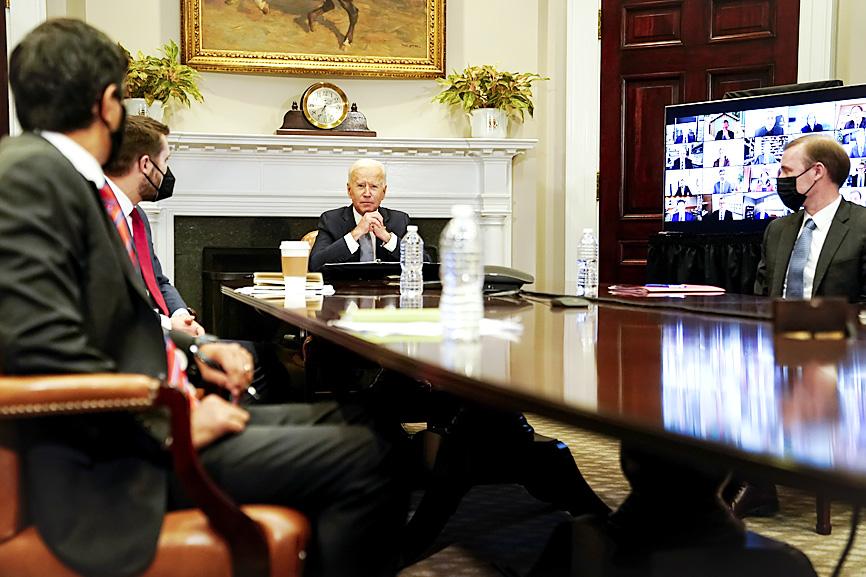Taiwan Semiconductor Manufacturing Co (TSMC, 台積電), the world’s largest contract chipmaker, on Monday took part in a virtual White House summit about a global semiconductor shortage and Washington’s plans to strengthen US supply chains.
The Hsinchu-based company was among 19 firms, including fellow chipmakers Samsung Electronics Co, GlobalFoundries Inc and Intel Corp, that attended the summit hosted by US National Security Adviser Jake Sullivan, US National Economic Council Director Brian Deese and US Secretary of Commerce Gina Raimondo.
US President Joe Biden told executives in the meeting that there is bipartisan support in the US Congress for efforts to strengthen the US semiconductor industry to better protect the manufacturers that rely on it.

Photo: EPA-EFE
Earlier in the day, Biden said that he had received a letter from a bipartisan group of 23 US senators and 42 US representatives, urging passage of the Creating Helpful Incentives for Producing Semiconductors for America Act, a proposed US$50 billion investment in semiconductor manufacturing and research.
Biden said that companies that make and use semiconductors, as well as US consumers, would benefit from a US$2 trillion infrastructure plan that he has put before lawmakers.
“These chips, these wafers ... batteries, broadband — it’s all infrastructure. We need to build the infrastructure of today, not repair the one of yesterday,” Biden said, adding that his plan would “protect our supply chains and revitalize American manufacturing.”
Intel chief executive officer Pat Gelsinger said in an interview after the meeting that the White House and Congress are working aggressively to support the semiconductor industry with more domestic manufacturing, research and development, and efforts to build the workforce.
TSMC also voiced its support. The contract chipmaker, which plays a central role in manufacturing most of the world’s most advanced semiconductors, has secured US government incentives to begin building a US$12 billion advanced chip plant in Phoenix, Arizona, this year.
TSMC chairman Mark Liu (劉德音) issued a statement after the meeting that highlighted his company’s investments in the US, but did not directly address what was discussed.
TSMC’s planned US$12 billion investment constitutes one of the US’ largest overseas investment plans in the past few years, Liu said, adding that he was confident the project would succeed with continued bipartisan support from Washington.
Monday’s meeting took place amid a shortage of computer chips that has hampered the global economic recovery from COVID-19, and prompted Biden in February to order a comprehensive review of US supply chains.
US automakers General Motors Co and Ford Motor Co, both of which attended the meeting, have had to announce production cuts and temporary plant closures in the past few weeks amid difficulties sourcing automotive chips.
Many major auto manufacturers cut their chip orders last year due to plunging demand caused by the COVID-19 pandemic.
Because those openings in chipmakers’ production schedules were later filled by orders from other industries, the automakers are now struggling to keep up with rising consumer demand.
However, the White House said that the summit was not intended to provide immediate solutions, but rather to consult with stakeholders on how the issue could be better addressed going forward.
Additional reporting by Bloomberg

South Korea’s equity benchmark yesterday crossed a new milestone just a month after surpassing the once-unthinkable 5,000 mark as surging global memory demand powers the country’s biggest chipmakers. The KOSPI advanced as much as 2.6 percent to a record 6,123, with Samsung Electronics Co and SK Hynix Inc each gaining more than 2 percent. With the benchmark now up 45 percent this year, South Korea’s stock market capitalization has also moved past France’s, following last month’s overtaking of Germany’s. Long overlooked by foreign funds, despite being undervalued, South Korean stocks have now emerged as clear winners in the global market. The so-called “artificial intelligence

NEW IDENTITY: Known for its software, India has expanded into hardware, with its semiconductor industry growing from US$38bn in 2023 to US$45bn to US$50bn India on Saturday inaugurated its first semiconductor assembly and test facility, a milestone in the government’s push to reduce dependence on foreign chipmakers and stake a claim in a sector dominated by China. Indian Prime Minister Narendra Modi opened US firm Micron Technology Inc’s semiconductor assembly, test and packaging unit in his home state of Gujarat, hailing the “dawn of a new era” for India’s technology ambitions. “When young Indians look back in the future, they will see this decade as the turning point in our tech future,” Modi told the event, which was broadcast on his YouTube channel. The plant would convert

‘SEISMIC SHIFT’: The researcher forecast there would be about 1.1 billion mobile shipments this year, down from 1.26 billion the prior year and erasing years of gains The global smartphone market is expected to contract 12.9 percent this year due to the unprecedented memorychip shortage, marking “a crisis like no other,” researcher International Data Corp (IDC) said. The new forecast, a dramatic revision down from earlier estimates, gives the latest accounting of the ongoing memory crunch that is affecting every corner of the electronics industry. The demand for advanced memory to power artificial intelligence (AI) tasks has drained global supply until well into next year and jeopardizes the business model of many smartphone makers. IDC forecast about 1.1 billion mobile shipments this year, down from 1.26 billion the prior

People stand in a Pokemon store in Tokyo on Thursday. One of the world highest-grossing franchises is celebrated its 30th anniversary yesterday.